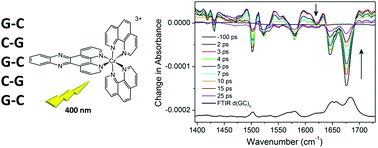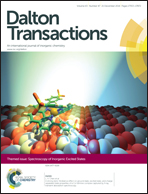Study of picosecond processes of an intercalated dipyridophenazine Cr(iii) complex bound to defined sequence DNAs using transient absorption and time-resolved infrared methods†
Abstract
Picosecond transient absorption (TA) and time-resolved infrared (TRIR) measurements of rac-[Cr(phen)2(dppz)]3+ (1) intercalated into double-stranded guanine-containing DNA reveal that the excited state is very rapidly quenched. As no evidence was found for the transient electron transfer products, it is proposed that the back electron transfer reaction must be even faster (<3 ps).

- This article is part of the themed collection: Spectroscopy of Inorganic Excited States

 Please wait while we load your content...
Please wait while we load your content...